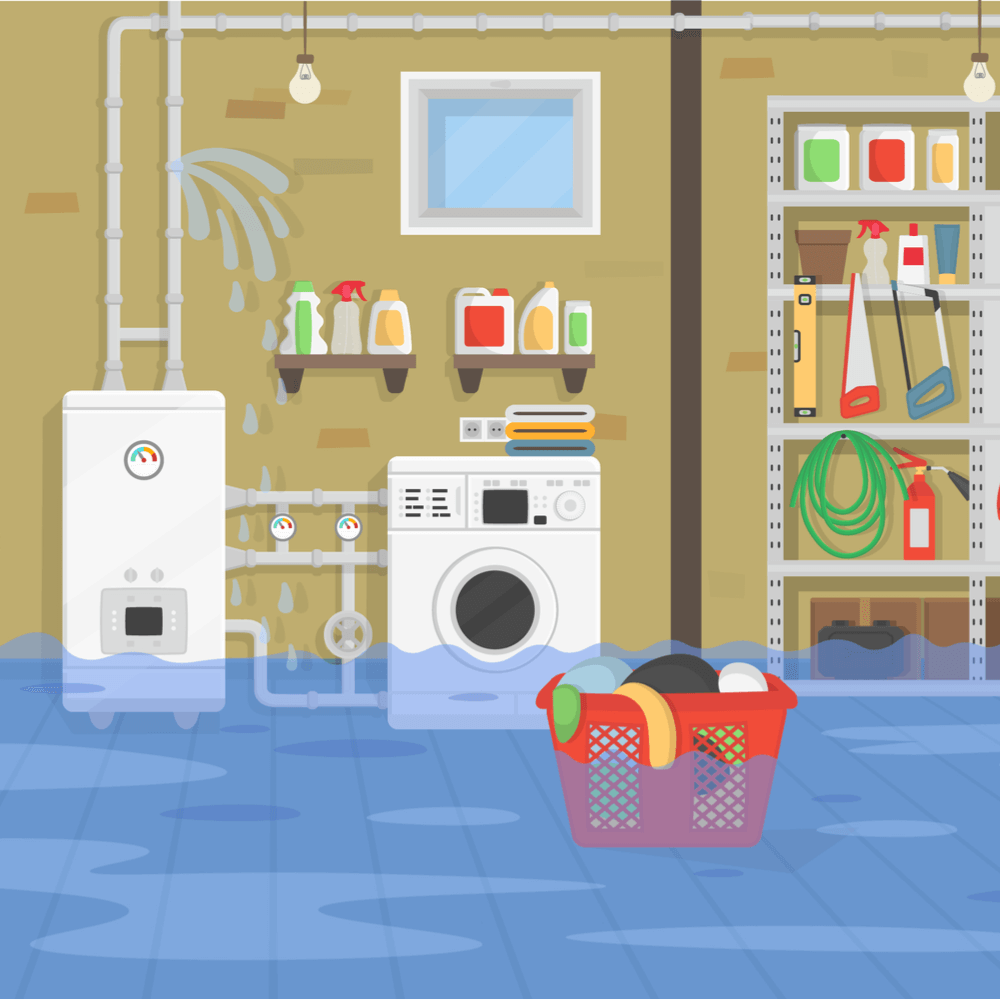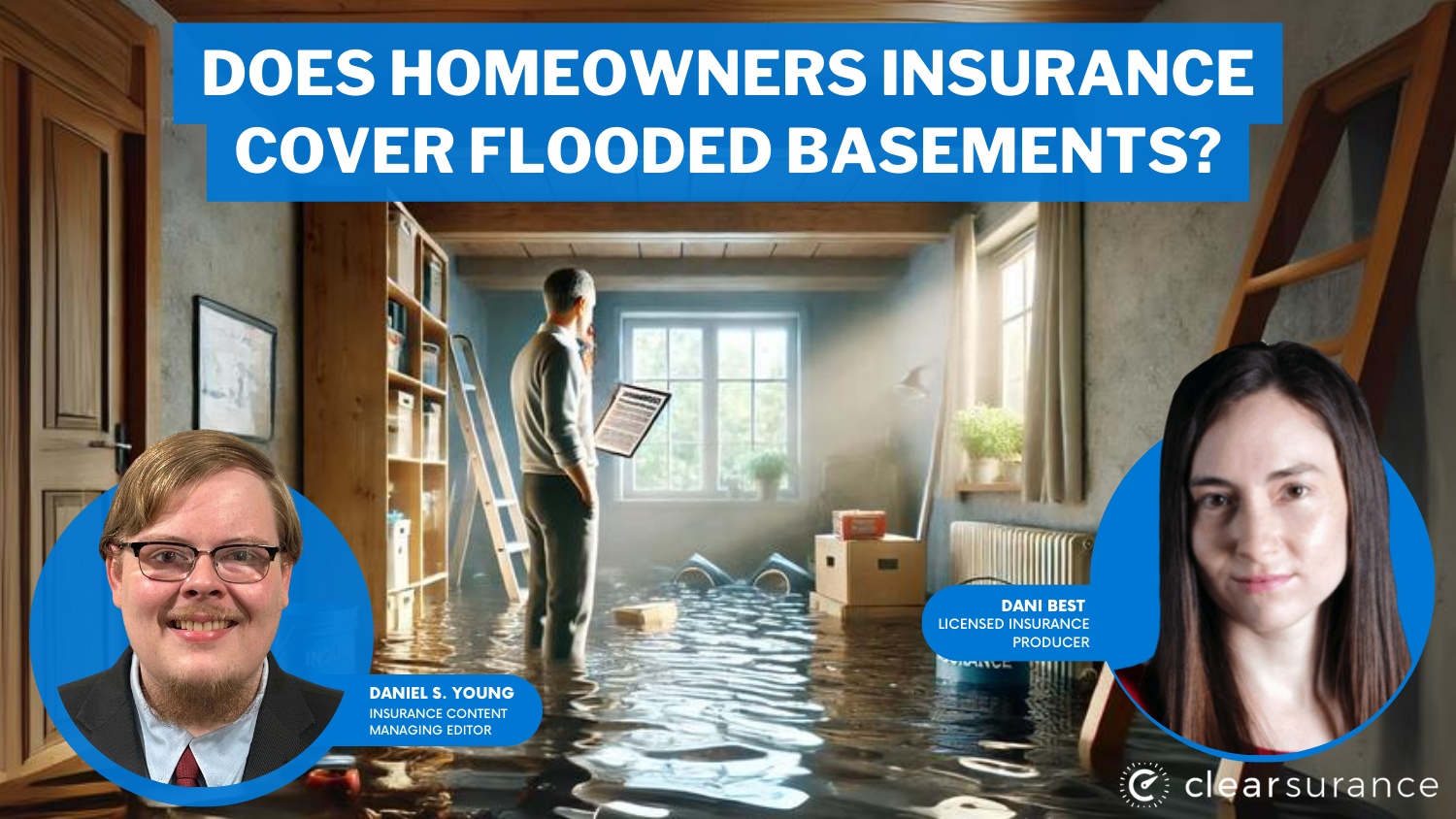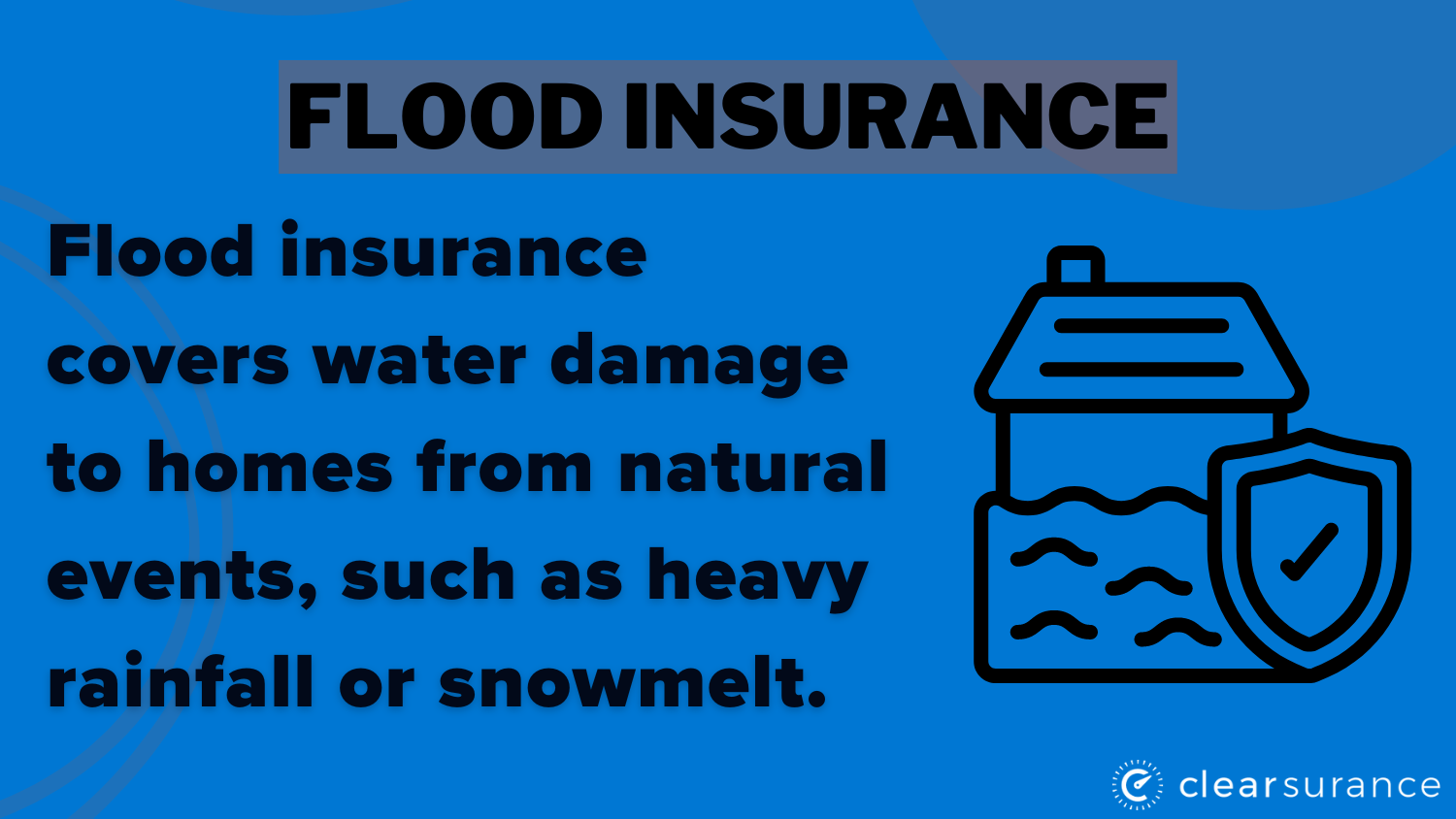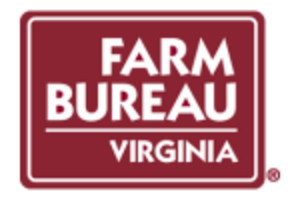
Does homeowners insurance cover flooded basements? Home insurance may cover damages from a burst pipe, but, generally, home insurance policies do not cover flooding unless you have basement flood insurance or an endorsement.

There are numerous reasons your basement could flood, so you should know whether you will be covered if you have a standard homeowners insurance policy.
The cause of the basement flooding is what determines if it’s covered under your general policy or not. Shop for affordable basement insurance today by entering your ZIP in our free tool.
What You Should Know
- Homeowners insurance may cover basement flooding from a burst pipe
- Flooding from broken appliances may be denied if machines weren't maintained
- Flooding from natural events is only covered under flood insurance basement coverage
When Homeowners Insurance Covers Flooding
One of the nightmares that homeowners face is a flooded basement, which can happen in many different ways. A flooded basement is one of the most challenging insurance situations for homeowners. The potential of this happening leaves many homeowners wondering: will my home insurance cover my flooded basement claim? The answer is that it depends.
Some situations are covered by homeowners insurance, while others require special types of coverage such as flood insurance or endorsement.
Structural damage to your home caused by flooding is generally covered if it happened because of something that was sudden and accidental inside your home. However, there are still gaps and reasons home insurance companies may deny your claims, which is one of the common customer complaints about home insurance.
Read More: Top 5 Most Common Consumer Homeowners Insurance Complaints
If you have an appliance or machine in your home that has malfunctioned or broken and caused a flood, your general policy will most likely cover you. Some appliances that may be culprits of this are your washing machine, air conditioning, refrigerator, or water heater. However, it’s not a given that these will be covered.
The last thing you want is your basement flooding insurance claim being denied, but your insurance may deny your claim if it determines that the machine broke because you failed to properly maintain it.
Another flooding situation that your homeowners insurance may cover is a frozen pipe that has burst, as long as it wasn’t caused by something like a slow leak over time that you neglected to fix. If you have a pool, bathtub, or sink that overflows by accident and causes damage, you may also be covered.
The general rule of thumb is that you will be covered for a flood if it was caused by something inside your home, and it was sudden and accidental.
If you properly maintain your appliances, you should be covered if something breaks unexpectedly and causes water damage.
When Homeowners Insurance Doesn't Cover Flooding
There are certain situations where your basement won't be covered by a homewners policy if it's flooded. Unfortunately, general homeowners insurance policies do not cover flooding for things that happen outside of your home.
Additional flooding situations that your homeowners insurance wouldn’t cover are sump pump or sewer backups. If your foundation suffers from cracks or if the drainage around your house is not sufficient, groundwater may make its way into your basement, and this wouldn’t be covered.
When You Should Purchase Flood Insurance
Flooding can cause serious damage and can put a serious strain on your family’s financials. Luckily, flood insurance coverage for basements can help with that.

Suppose you live in a high-risk area of natural disasters and have a mortgage on your home. In that case, chances are you’re required to have flood insurance coverage on top of your traditional homeowners insurance policy.
But just because you aren’t in a high-risk flood area doesn’t mean you should rule out purchasing flood insurance. Take a look at the monthly cost of flood insurance at different companies below.
| Insurance Company | Monthly Cost | Notes |
|---|---|---|
| $100 | Coverage through National Flood Insurance Program (NFIP) and private options | |
| $100 | Works with NFIP and offers private insurance options | |
| $90 | Offers both NFIP and private flood insurance | |
| $90 | Flood insurance offered through NFIP partnerships | |
 |
$100 | Partners with NFIP but also offers private flood insurance for broader coverage |
 |
$110 | NFIP policies available, higher premiums in high-risk areas |
| $95 | Offers flood insurance through partners such as NFIP | |
| $120 | Works with NFIP, offering standard and excess flood coverage | |
| $120 | Private flood insurance options for more extensive coverage | |
| $70 | Available to military families through NFIP |
Since 1990, the average annual precipitation in the U.S. has increased about five percent, but some areas have seen a larger increase, closer to 10 percent. An increased amount of precipitation causes an increased risk of flooding and landslides as more precipitation puts pressure on dams and water levels.
The National Flood Insurance Program also reports that 20 percent of flood claims happen to properties that are not in a high-risk area. If you live near a flood zone, regardless of the risk factor in your zone, you should consider flood insurance to make sure water damage in basement is covered by insurance.
Read More: Top 5 Lessons Learned from Consumer Reviews After a Natural Disaster
The majority of flood insurance is offered through the National Flood Insurance Program (NFIP) that FEMA offers. Some insurance companies offer flood insurance, which you can add to your homeowners insurance policy if you want your flooded basement covered by insurance.
Living in a Flood Zone
Flooding can be a serious catastrophe — flash floods are the top weather-related killer in the United States. Every state has experienced some degree of flooding in the past five years. Even if you don’t live in a flood zone, you should still be prepared for the potential of it happening.
Fortunately, most floods can be predicted as they take time to develop. If you receive warning of a severe flood, your safety should be your top priority. Make sure you leave the area and get to higher elevation to escape being trapped in floodwaters.
You should have an evacuation plan if flooding is common in your area and always be aware of flood warnings and watches. In the event of an evacuation, be sure to bring limited personal items with you that include any medication or valuables.
Additionally, there are ways that you can reduce damage to your property by anticipating and preparing your home.
Elevate anything in the basement that water could damage and move any valuable items to a safer place where it is less likely to suffer damage in a flood. Check your sump pump to make sure its operating properly, and clear gutters and drains to ensure they work properly.
Preventing Floods in Your Home
Flooding may be most likely if you live in a flood zone, but flooding from weather and natural disasters is not the only way you could end up with an unwanted pool of water in your basement and having to make an insurance claim for a flooded basement.
While you can’t prevent mother nature from causing a flood in your home, you can prevent other floods from happening inside your home and know how to unflood a basement. Always check your appliances and pipes for any sign of leaking or wear that could cause them to break.
If you see an issue, make sure to get it fixed to prevent potentially detrimental damage. If you fail to repair the flood damage in a timely fashion and mold develops, your homeowners insurance may not cover the mold damage.
Read More: Does homeowners insurance cover mold?
Regularly inspect all appliances, drainage and foundation. You should also know where your water cut-off valve is located so you can quickly turn your water off in an emergency.
Finding the Best Flood Insurance For Your Home
Always be sure to check with your insurance company to see what your basement insurance coverage covers for water damage and thoroughly weigh your flood risk to determine if you need flood insurance for basement flooding.
Read More: Flood Insurance Guide: How To Get Flood Insurance
Perils like flooding create fears for homeowners, and a flood insurance policy may give you peace of mind that your home could be covered in the event of a damaging flood.
Looking to find cheap basement flooding insurance today? Compare rates with our free quote tool to get the best deal.
Frequently Asked Questions
Is basement flooding covered by homeowners insurance?
Basement flooded insurance claims may be covered by home insurance if the flooding was due to a burst pipe. However, a flooded basement from rain and other natural events will only be covered if homeowners have flood insurance.
My basement flooded what will insurance cover?
If you have the right flooded basement insurance coverages, then insurance will help cover the cost of repairing and replacing damaged property.
Does renters insurance cover flooded basements?
Renters insurance may cover water damage if a pipe bursts, but it will not cover water damages due to flooding (Learn More: What does renters insurance not cover?).
Does insurance cover basement flooding from rain?
A basement that is covered or flooded with water from rain will only be covered if you have flood insurance. Find cheap basement flood insurance coverage today with our free quote tool.
What does flood insurance cover in a basement?
Flood insurance will help cover the cost of repairs and replacements of property, such as electric, drywall, and furniture.
Does State Farm cover basement flooding?
State Farm insurance will cover basement flooding if it is from a burst pipe, but State Farm basement flooding insurance will only cover flooding from rain and other natural events if you have flood insurance.
Does flood insurance cover foundation damage?
Yes, flood insurance helps cover foundation damages from flooding.
Does flood insurance cover sump pump failure?
No, flood insurance doesn't cover flooding from a sump pump failure.
How do I make a flooded basement insurance claim?
Contact your insurance company to file a claim, and they can guide you through the process of a basement flood insurance claim. Keep in mind, you’ll be responsible for paying your insurance deductible before your insurance company covers any remaining costs associated with the damage in a claim (Learn More: What is an insurance deductible?).
Does homeowners insurance cover basement leaks?
Homeowners insurance will only cover leaks if you have the right basement leak insurance coverage, such as flood insurance or an endorsement.
The content on this site is offered only as a public service to the web community and does not constitute solicitation or provision of legal advice. This site should not be used as a substitute for obtaining legal advice from an insurance company or an attorney licensed or authorized to practice in your jurisdiction. You should always consult a suitably qualified attorney regarding any specific legal problem or matter. The comments and opinions expressed on this site are of the individual author and may not reflect the opinions of the insurance company or any individual attorney.








